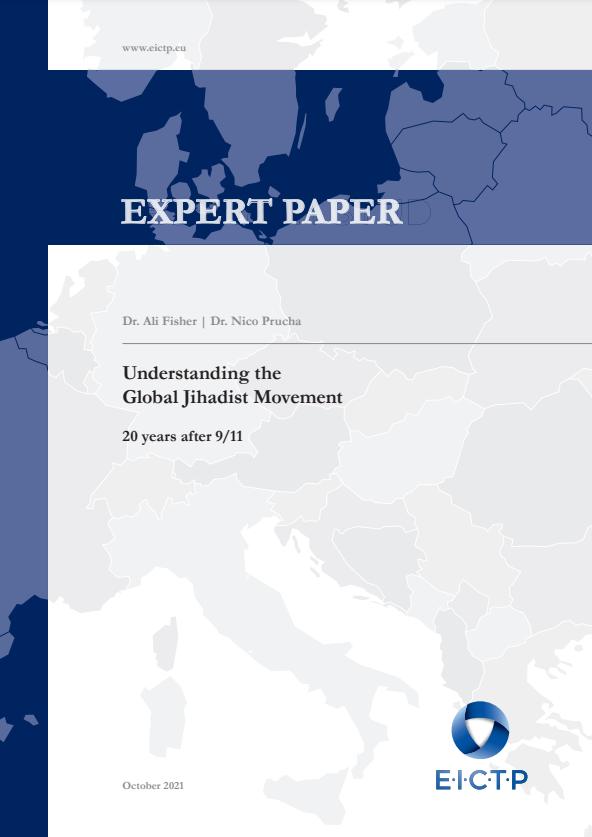EICTP has published a new report
Understanding the Global Jihadist Movement: 20 years after 9/11

Ali Fisher & Nico Prucha, Understanding the Global Jihadist Movement: 20 years after 9/11, EICTP Expert Paper.
Full paper can be downloaded here
Report is also available over IPFS:
https://gateway.pinata.cloud/ipfs/Qmc3UosG4VMoK92JT95UZ6HFHXc7sRScqqj631GD3KfhYd
This report is written as part of the Jihadi Ecology Project
Report Summary:
- Terrorist groups remain strong despite Western claims that the groups have been defeated.
- Understanding the theology important to the Salafi-Jihadi movement is central to Counter Terrorism policy. Specifically, if policy is to weaken terrorist groups such as AQ and IS beyond blunting their combat capability through superior military power.
Understanding the Global Jihadist Movement: 20 years after 9/11 is written by Ali Fisher and Nico Prucha. It is the first in a series of evidence-based research reports to examine the roots of the resilience shown by the Salafi-Jihadi movement in the face of the Western-led War on Terror.
The research finds:
- Western claims that global jihadi groups have been defeated have repeatedly proven to be expressions of profound Western optimism rather than evidence-based analysis.
- Despite killing thousands of Salafi-Jihadi fighters and numerous Jihadi leaders, the reality on the ground is that the global Salafi-Jihadi movement has demonstrated enduring resilience, expanded its operational capability, and recruited a large and more diverse generation of followers than ever before.
- These circumstances are much worse now than before 9/11.
- It concludes the Salafi-Jihadi movement is driven by and draws strength from its specific interpretation of theology.
Key Points
Based on in-depth analysis of the material produced by the Salafi-Jihadi movement in their primary language of Arabic, Understanding the Global Jihadist Movement: 20 years after 9/11 demonstrates:
- Military force can blunt the operational effectiveness of the Salafi-Jihadi movement. However, the struggle against the movement is one of disrupting the specific ideas or concepts around which the movement coordinates.
- Disrupting the Salafi-Jihadi movement must be evidence-based;
- The theological references in the material the movement produces,
- What it is intended to mean to potential supporters,
- How it is likely to be understood by the target audience,
- Running parallel with the need to emphasise theology, policy must be nuanced:
- Salafi-Jihadi groups define the majority of Muslims as apostates. The punishment they seek to impose is death.
- Counter Terrorism policy must be applied with appropriate nuance to distinguish the vast majority of Muslims [who Salafi-Jihadi groups threaten to kill for their beliefs], from the individuals perpetrating attacks inspired by the Salafi-Jihadi movement.
These elements are frequently missing from Western approaches to counter the Salafi-Jihadi movement and specifically claims Salafi-Jihad groups such as AQ, IS, Taliban have all been defeated.
The Policy Challenge
To diminish the effectiveness of Salafi-Jihadi groups, Western policy must have a clear view of the purpose, strategy and tactics of the movement drawing on an evidence-based analysis of what the movement communicates with its target audience.
The orthodox and politically convenient view of decline and defeat of Salafi-Jihadi groups is firmly rooted in a branch of Political Science.
Understanding the Global Jihadist Movement: 20 years after 9/11 shows that the views within the current Transatlantic orthodoxy of terrorism studies have frequently reflected:
- The Western-centric perspectives of their authors rather than an evidence-based analysis of how Salafi-Jihadi communicate with their target audience.
- The systemic devaluation of Arabic sources and ‘whittling away’ the very theological concepts on which the movement is based.
- The devaluation of Salafi-Jihadi theology, expressed in Arabic, is justified by researchers claiming they can ‘uncloak’ the real motivations of the Salafi-Jihdi movement by drawing on superficial pet theories such as crime, rap music, gore porn, and offers of kittens, Nutella, and eating ice cream in a so-called ‘Jihadi Utopia’.
Almost none of this research can provide quotes nor meaningful analysis of previous Salafi-Jihadi writing to support these claims. It appears the current transatlantic orthodoxy simple does not require this type of evidence-based work in publications from the ‘experts’ who make up their number.
It should be obvious that kittens, Nutella, rap music, crime and vague Western notions of creating a ‘jihadi utopia’ on earth are insufficient to explain the ability of Salafi-Jihadi groups to continue, in the face of a physical assault by some of world’s most powerful military organisations and repeated killing of their leaders.
The Taliban returned to power after a 20-year war and repeated assertions they were defeated.
Despite claims IS is defeated, the group still employs tactics including Katyusha rockets, RPG, IED, targeted assassinations and regularly destroys military installations across Asia, Africa, and the Middle East.
Which European country would accept the claim that a group was defeated if these attacks were perpetrated by a domestic terror group, or the attacks happened within their borders? Why should a different standard be applied in Iraq or other parts of the world?
Further Research
Future reports examine in detail the specific theology expressed in the hundreds of thousands of pages of material the movement have produced, and the resilience of the distribution systems they have developed to distribute their material.
Salafi-Jihadi Ecology Project
This report was written as part of the Jihadi Ecology Project